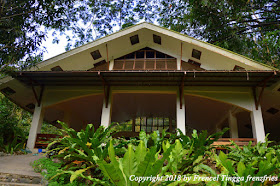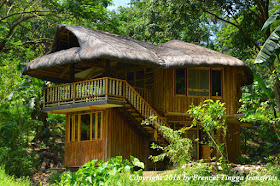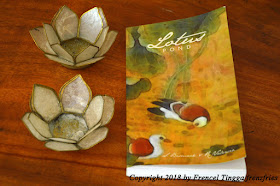“The bamboo that bends is stronger than the oak that
resists.”
- Japanese Proverb
Bamboo has proven to be a vital resource for its diverse, functional and traditional uses. Among the woody plants, bamboo stands out because it possesses strong, unique qualities and contributes significantly to ecological stability.
While growing up in the province, native green bamboos are a common sight in my neighborhood and in the hometowns of my lolo and lola. But it was only when I visited the Lotus Valley Farm in Dasay, San Juan, La Union, that I was able to see for the first time another beautiful species of bamboo – the black bamboo (Phyllostachys nigra). The rare and exotic bamboo type is native to Hunan Province of China but also widely cultivated worldwide. Sir Ramon “Toby” Tamayo, retired military man, environmentalist and owner of the forest farm got the bamboo as a gift from a friend. Now, it serves as one of the main distinctive attractions of the Lotus Valley.
The property was acquired by Sir Toby almost a decade ago. Wrecked by chemical farming, the piece of land was in a rundown and neglected state then – terraces were cut into the slope, few surviving trees had been periodically chopped down, and basically no sign of wildlife. But thru his sheer effort and wonderful vision, with the support of his wife Marissa and their children, as well as the local community and the environmental foundation SIFCare, he was able to heal (by planting trees and plants, lots and lots of them) and transform the land into a thriving and sustainable eco-tourism farm and wellness sanctuary. The flora and fauna he’s managed to nurse back to health and cultivate are so abundant and happily alive. The farm which implements responsible and sustainable practices in protecting the environment and natural resources, is his legacy for the future generations.
I had the privilege of being brought to this secret gem of a place by Sir Toby’s son Carlos. We came from their beach house in San Juan, which is just a 20 minute drive away.
Behind the unassuming gate is a biodiverse ecosystem with thick foliage and variety of plants. Their anahaws, which look like giant fans, are a sight to behold.
The home of the couple is also located within the property. It was actually for health reasons and to get away from the crazy jungle city life, why the couple decided to live and retire in this little paradise. Their staff and caretakers are warm and hospitable.
Carlos gave me an educational tour around their property, which also has an open pavilion (that serves as a venue for various seminars and trainings) and a dormitory (that could host youth campers). The farm offers tours, acupuncture treatments, and tai chi and qi gong classes. The provincial government of La Union and SIFCare often hold their official functions and activities (with a little R&R) in the farm.
Carlos also gladly shared that their land has sources for clean spring water. Experts even said that their spring water is cleaner and contains more minerals than purified and tap water. Remarkably, Lotus Valley provides free potable water to a large number of families within the vicinity, and to the nearby elementary school. It’s no wonder why Sir Toby is well-loved in the community.
I love how verdant and lush the surroundings, providing ample supply of fresh oxygen, shade and healing aromas. The green rainforest is now host to a wide array of native and towering trees, heirloom rice, unique plants (including lotus, which unfortunately were not on their flowering stage during the time of my stay), monitor lizards, wild bee colonies, birds and insects.
I was also surprised to find out that Lotus Valley supply grains and other organic food products to well-known establishments in San Juan like Flotsam and Jetsam, El Union, and Papa Bear.
The place could also pass as a living bamboo museum with the different types of bamboo flourishing within the property. They have golden bamboo, green bamboo, giant bamboo, serpent bamboo, Buddha’s belly bamboo and the black bamboo.
These giant grasses are simply amazing – they not only protect the environment and cleanse the air, they are also versatile material for a variety of economic uses including handicraft and furniture, and house construction. I wish they would just rename their place to Black Bamboo Farm (even though Carlos told me that his father named it after the sacred flower because it symbolizes purity and spiritual awakening as the lotus flower blooms most beautifully from the deepest mud).
After the tour, I was allowed to check in one of their bamboo huts, nestled in the valley and delightfully surrounded by nature. The huts, made of bamboo, wood, and cogon that they grew themselves, are one-of-a-kind, native and ingenious in style. Each hut, featuring a unique nature theme and decorated with hand-crafted furniture, comes with living room, dining room, veranda, private bathroom, and three beds that could sleep maximum of eight people comfortably. They were innovatively designed by the couple incorporating contemporary and traditional, and climate-responsive architecture. The structures are adapted to and are in harmony with the local climate and natural conditions. Wind flow was harnessed for natural air conditioning; there is no need anymore for an aircon or electric fan especially at night when temperature drops and the northeast wind from the mountain goes directly into the bedrooms encouraging restful sleep. The huts are also hexagonal in shape and structure (including the gorgeous windows) which means they can carry ten times more than their weight, withstand strong typhoon winds, and do not absorb much heat from the sun.
I wanted to live in those huts. Seriously, dreamily. The first one is the Giant Bamboo Hut.
The second and my home for the night is the Black Bamboo Hut, the first structure built in the property. The hut was actually the first home of the Tamayo’s before they erected another one on a higher ground.
It is admirable how Lotus Valley is able to showcase bamboo as a material of choice. I had a peaceful and extraordinary stay at the kubo – just relaxing, gazing at the verdant ricefield, listening to the chirping of the birds, and watching fireflies at night. I felt more relaxed and invigorated. I even read the bedside book “Lotus Pond” by S. Bismark & R. Valencia, probably left by the couple for guests to have more spiritual enlightenment. The book has several beautiful passages about finding eternal happiness, holding on and letting go - “That is everyone’s choice: to stay or not to stay. People who have realized the unhappy nature of this world and understood the need to seek out our real destination put effort into learning the process of liberation.”
I also nourished myself with healthy and organic food prepared and pabaon by Carlos’ wife Kristine. The cereal with dragon fruit and milk is simply the best breakfast that I personally made.
It’s incredible and very inspiring how Sir Tony converted the land into a serene forest oasis, made it fertile again, and restored its very soul.
Healing
takes time. It takes preparation. It takes love. The wind blows and bamboos
dance gently into the night.
From Manila, take Vigan, Laoag or Abra-bound bus (bus
terminals in Cubao, Sampaloc or Pasay). Get off in San Fernando, La Union. Take
a jeepney bound for Balbalosa and get off at Dasay Elementary School. From the
school it is a 10-minute uphill walk to the farm. Other option is to rent a
tricycle from San Fernando or San Juan going to Dasay or arrange transportation
with the owner.
Lotus Valley Farm
Sitio Kasilagan, Brgy. Dasay
San Juan, La Union
Tel. No.: 0942-3664519






















































No comments:
Post a Comment